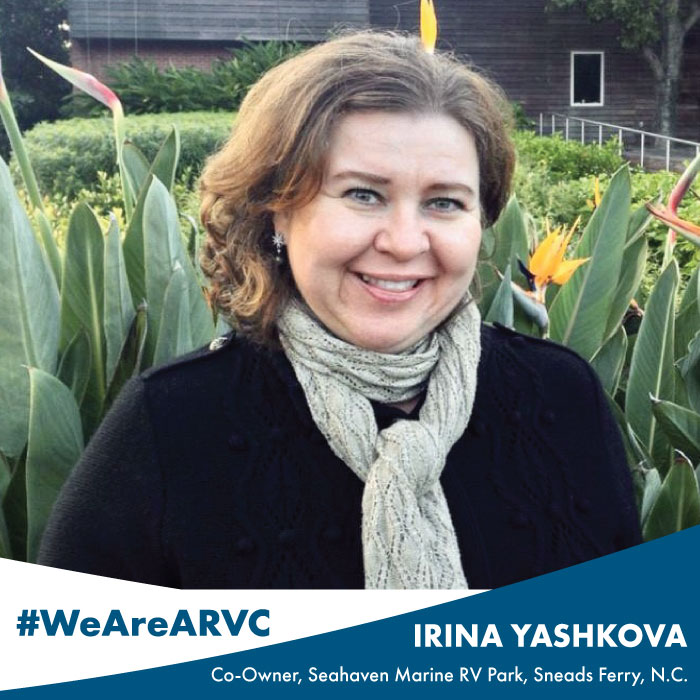
Leadership Profile: Irina Yashkova, OHP
Irina Yashkova, OHP
Co-Owner, Seahaven Marine RV Park, Sneads Ferry, N.C.
Campground owners come from a wide variety of backgrounds. What makes yours unique?
I was born in Siberia and for the past 20+ years, I have been supporting the NASA International Space Station Program as a professional simultaneous interpreter, liaison and cultural adviser. They say only five percent of the population can do this type of work psychologically, as we humans are not wired for listening, processing the information and speaking at the same time. I have a BA from Russia, a master’s degree in simultaneous interpretation from the Monterey Institute of International Studies (now the Middlebury Institute of International Studies) and an Executive MBA from Antwerp, Belgium. Coming from Siberia, which is such a vast land, I was very curious to go and see what’s on the other side, and that is what has brought me to visit about 30 countries.
How did you become involved in the Carolinas Association of RV Parks and Campgrounds (CARVC)?
My husband Kal and I took over the park about six years ago when his father Moustafa was ready to retire. Kal was coming from the oil and gas industry where he ran operations of 1,000 people and I was coming from the space program where I ran operations with 100 people supporting NASA in Russia and Kazakhstan. Although we had a lot of management experience, we were not prepared to run a campground. We had strong associations in our other industries so I thought there must be something for RV parks. I Googled it and that’s how I found CARVC. I called the number listed and spoke to (Executive Director) Dee Witting for about 30 minutes, then told Kal, “I found the people that are our people. We’re going to join the association.”
What impact has joining your state association had on your park operations?
After we joined CARVC, we hosted the Board of Directors at Seahaven. Dee Witting, Adam Smith, Barb Krumm, Michael Hobby and Rebecca Murphy, among others, came and we had a walkthrough of the park. They shared a lot of ideas with us and kind of opened our eyes on different possibilities. We were extremely thankful for that support and for their kindness and generosity. We started coming to conventions and actively learning and sharing and networking and we just felt CARVC was like a family. We know that if anything major happens, we can pick up the phone and call Dee.
You’re also a graduate of ARVC’s National School of RV Park and Campground Management. How has the school helped better prepare you to run your campground?
It was an absolutely amazing experience. I feel we were so lucky that both Kal and I signed up for it. I would recommend anybody who is a husband-and-wife team to go at the same time. The ARVC team was just amazing and the curriculum was outstanding. As I said before, managing was not new to either of us, but it wasn’t good basic management skills that we were looking for. We were looking at the world of RV parks—accounting, legal, marketing, construction and activities. The curriculum was built so well. It was a wealth of information. Kal and I were listening with our eyes wide open. We couldn’t eat and couldn’t sleep—we were so excited! We must have drafted about 150 action items from what we learned. We implemented a lot of those action items immediately and I think we saw an increase in revenue by 20 percent almost immediately. We would recommend the school to anybody. The cost of school will be covered three, four, ten times by an increase in revenue. The networking of graduates from the National School was also important. I feel Iike I can call any of my classmates and they would be very generous and sharing.
You have extensive expertise in cross-cultural communications. What can other park owners learn from the knowledge you’ve acquired?
We need to open our eyes to the way we communicate and the way we’re perceived by others. Ultimately, we want to be successful as a business without wasting our time on misunderstanding and putting each other down. If you look at culture as an iceberg, those differences on the top that we see are not as important as the values we share and the way we communicate. We all share values that are common to humankind—we love children, we want to be liked, to procreate, we are angered by injustice and have gratitude for favors and a will to survive.
I think that as campground owners, we also need to be very adaptable and develop an awareness of different styles of communication and listening. Cross-cultural communications are not just about cultures in terms of what countries people are coming from. They’re also about the culture of how people operate and how they perceive the world.

